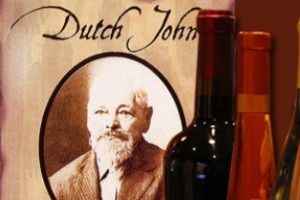“Dutch John” Galler, Aged 108, Dies at the Home of his son, Wm. Galler, Wednesday Night. One of Earliest Omak White Settlers
The owners of Dutch John’s Wines have retired and the winery is currently closed. The story of Dutch John is still incredible and is memorialized below.
Word was brought to town Thursday morning of the death of John Galler, who was not only one of the early white settlers in this part of the valley, but also its oldest resident in point of age.

Mr. Galler first settled near where Wenatchee now stands but later moved on to the central part of the Okanogan Valley and has been a resident of this section ever since.
As nearly as can be figured out by his children, Mr. Gallery was 108 years, 1 month and 23 days. He was of German descent, coming to this country when but a lad, and his memory of historical events of early days in both Europe and this country was remarkable as was his strength as he had always led an active life and was able to care for himself up to the time of his death.
207 – H Mission Avenue
Cashmere, Washington 98815
509-782-3845
View Larger Map
The story of Dutch John
“Dutch John” Galler, Aged 108, Dies at the Home of his son, Wm. Galler, Wednesday Night. One of Earliest Omak White Settlers
Word was brought to town Thursday morning of the death of John Galler, who was not only one of the early white settlers in this part of the valley, but also its oldest resident in point of age.
Mr. Galler first settled near where Wenatchee now stands but later moved on to the central part of the Okanogan Valley and has been a resident of this section ever since.
As nearly as can be figured out by his children, Mr. Gallery was 108 years, 1 month and 23 days. He was of German descent, coming to this country when but a lad, and his memory of historical events of early days in both Europe and this country was remarkable as was his strength as he had always led an active life and was able to care for himself up to the time of his death.
Funeral at Mission Friday at 2:30 p.m.
Notes:
According to this newspaper account, John Galler died Wednesday, February 23, 1921, Born January 1, 1913 or perhaps December 31, 1812.Married – Charley Galler and Caroline Joseph on May 12, 1911
Died – Charles Orr on February 2, 1917 of Pneumonia, buried at Omak Cemetery. (Do not know if this is a relative or not. Do you know?)
Gravestones at Catholic Cemetery off Highway 155, Nespelem:
Arline Orr Duffy March 21, 1935 – July 3, 1977 (She was Joe Orr’s daughter)
Lucy Nason Walsh – 1885 – 1973
The original of the following letter can be found in the Louisa Orr file, #781, at the Records and Probate Office, Colville Indian Agency, Nespelem, Wash. There was no date on the letter but judging from the other material in the file, I would guess the letter was written around 1910.
Copy of text of letter:
Mr. Mc A. Webster
Capt. U.S.A.
Indian Agent
Miles P.O., Wash.Dear Sir:
Six years ago Mr. Casson allotment Agent when at Wenatchee told all of us (the Galler family, half breeds) to go and take up land on the south half of the Reservation Colville, awaiting allotments. We then all went there and took up land and I and my husband, a half breed had to go back to Wenatchee again but have been up and down ever since. All our relatives are here on the South Half of the Colville Reservation, and I want to know if we get them. I was born at Wenatchee and belong to the Moses tribe. My grandfather being born on the Colville Reservation and first cousin to Chief Moses besides we have relations living here now such as Smitken, his sister Betsy Sweekin ad others and have always kept up our tribal relations with them. This for your information if any more needed please let me know at your earliest convenience and oblige. Yours very truly,
(signed) Louisa Galler
Omak P.O.,
Okanogan Co., Wash.
WENATCHEE DAILY WORLD
Thursday, August 15, 1918News and Editorial Comment
Suggested by Two Weeks’ Trip
Over Territory of Daily WorldA VISIT WITH JOHN GALLER, 105 YEARS OLD AND FIRST SETTLER IN WENATCHEE VALLEY
By RUFUS WOODS
In the Good book where it says that man’s natural span is three score years and ten, it wasn’t referring to “Dutch John” Galler, for John has it all over the rest of us when it comes to counting off the decades. He is now 105 years old, and next January he will be able to count off 106 before reaching the end of the measurement of his longevity. For fifteen years we have been hearing about “Dutch John,” but it was only the other day that on hearing that he was somewhere on the reservation, that we decided to hunt him to his lair. N company with Dr. E. H. Todd, president of Puget Sound College, we started out to find this interesting man. Fortunately we found on arriving at Omak that Bill Galler, oldest son of the old pioneer, was in town. Bill piloted us onto the reservation. Up Omak Creek we went. We were informed that the centenarian lived with his son on the road between Omak and Nespelem. We found him out 18 miles from Omak.
John Galler is not only the first white man to locate in the Wenatchee country, but he was also the first to live in Ellensburg and previous to that was on the first boat which came up the Missouri River bringing material for the laying out of Fort Omaha. He believes he was the first settler in Nebraska. So that a visit with Galler has a double interest. His age alone is enough to make one desire to sit at his feet and hear the wisdom of a bygone era. But the historical features of his life are enchanting.
Galler is old and feeble. It was the first time that we had ever met him. Hence it was hard to get up a conversation. He has a most vivid recollection of things that transpired fifty, seventy and eighty years ago. But his memory of things more recent is not acute. It took an hour to get him started to relate his reminiscences. But when he got started we felt well repaid for all our pains.
Do you realize that this old man now living among us was what we term a middle aged man of thirty-five years of age way back in 1848? He had been serving in the German army. In those days the effect of the new republic of France was being felt in Germany and throughout all Europe. The people were restless. They wanted more of an opportunity to rule themselves. Galler says that he was a soldier in Germany under Franz Sigel. This same Fritz afterwards became one of the best-known generals of the American Civil War.
About this time revolutions broke out in Germany. It was the question of monarchism versus republicanism. Former German citizens tell us that histories in Germany do not say anything about the uprising of the people during these days when the question of whether or not Germany was to be a republic was decided. Gallery says that Siegel quit the German army and became one of the heads of a revolutionary movement. History tells us that these revolutions were unsuccessful. On comparing Galler’s statements with history we have found them to be uniformly correct. He states, however, that the Germans and French had trouble in 1848 and in 1849 and it was in this war that he served as a German soldier. We have been unable to find a historical account of trouble with France at that time. The trouble he says occurred in Baden. There were 100,000 men against an army of only 26,000.
When Franz Sigel organized the revolution and was defeated by the armies of King William, he found it necessary to get out of the country. He went to Switzerland. Sigel’s own father, who was an officer in King William’s government, placed a reward for anyone who would kill him. He came to America together with many others who forsook the Fatherland about that time. For it is a well known fact that many of those who led the revolution included many of the best men of Germany. America became their home and now seventy years after, John Galler lives to see the present war, the seeds of which were sown in 1848 by the overthrow of popular government.
Galler was born in Baden in 1813. His father hunted for the government. He laid out roads in the timber and looked after the game preserves. When the father was informed that young Galler was going to America, he told him not to settle down as a farmer but to get out and trap and hunt and he would thus make more money. How well the paternal admonition was carried out is evidenced by the fact that during his seventy years of residence in American he has continued the entire time to make his home in the western solitudes and beyond even the fringe of civilization. He is still as near the outposts as it is possible to get in this country.
Gallery may not have been the first settler in the state of Nebraska, but he was easily the first settler in the place where he located. He says he went out and made a location on the Elkhorn River west of Omaha. It was two years before he saw a white man. The Indians had established a rule that no white man should take up land in their country. When they saw the German had located only to trap and hunt they let him remain without any trouble. But the Indian chief informed him one day that a party of whites had been killed. He went to the island and the Indians pointed out to him the smoldering remains of a wagon. The six-horse team of oxen had been killed and lay by the wagon. The man with his wife and family had been killed by the Indians and their bodies thrown into the river. The Indian chief offered to give him some of the flour and hams which had been taken from the wagon but Galler refused to receive it.
A short time later another emigrant with his wife and family decided to locate in the country west of Galler’s abode. He was warned of his danger but he refused to give heed. A few nights later the members of the family made their way to Galler’s hut informing him that the Indians had driven off his oxen and had burned his tents and wagon.
There were the times when the gold seekers were headed for California. Galler stayed six years in Nebraska, long enough to see great wagon trains of emigrants headed for the Eldorado.
He says he saw the Pawnees in their blankets. He remembers his first impression when with the snow on the ground one of the old Pawnees opened his blanket and he was the red man entirely naked, except only for the blanket which he wore. An old chief once came to him and said, “How How.” The Indian then asked if he was French to which Galler replied in the affirmative. The Indian told him that they killed white men but not Frenchmen.
“Have you a wife?” asked the chief. “No,” said Galler. “Come over and get one,” said the chief. Galler informed him that he didn’t want any. But he says he went to the camp and saw 5,000 or 6,000 Indians at one time.
Galler tells of the great bands of elk that roamed the plains. He saw myriads of wild geese and ducks and buffalos by the thousands on the plains. The Indians in those days used nothing but the bow and arrow.
WENATCHEE DAILY WORLD
Friday, August 16, 1918News and Editorial Comment
Suggested by Two Weeks’ Trip
Over Territory of Daily WorldA VISIT WITH JOHN GALLER, 105 YEARS OLD AND FIRST SETTLER IN WENATCHEE VALLEY
By RUFUS WOODS
After he had resided in Nebraska for six years, Galler went to Montana where he remained for the same period. He then came to Ellensburg and according to his statement, which is probably correct, he we the first man to locate in that territory. In Ellensburg in later years he met the Hickey family. It developed that Galler came across the Atlantic on the same boat which brought Mrs. Hickey, mother to Matt Hickey, the present county commissioner of Chelan County.
While in Ellensburg he told the Hickey family that he was going across the mountains to Wenatchee, that he was “going to marry a Koochman, plant grapes, make wine and live like a king.” Galler carried out his program. He married a young Indian woman 17 years of age. He resided at the mouth of the Squilchuck on what is known as the J. H. Lebeck farm. He tells with great glee the amount of wine which he made yearly, sometimes $2,000 worth in a year, he says. His residence in Ellensburg was for four years. At that time he had a partner by the name of Fred Ludi. Jack Splawn, in his history, tells of Dutch John and Fred Ludi. Galler also thinks he was the first white man in Yakima but he is incorrect according to other authorities. He knew Jack Splawn, Billy Splawn and other old timers in that section.
He came to Wenatchee about 1868 as nearly as he can remember. This was four years ahead of Sam Miller and John Freer who owned the first trading post in this locality. He relates many interesting things relative to the history of this country. In an early day the Columbia river. On his ar- the Columbia river. On his first arrival from Ellensburg, however, his first location was in Nahanun Canyon, three miles back of the old town of Mission, now Cashmere. He later located at the mouth of Peshastin Creek and for a time mined along that stream.
Galler had a family of six girls and three boys. All of the girls married white men and are now living in the Okanogan on the Colville Indian reservation, except one who died in early womanhood. The three sons are Bill, with whom Galler now lives, Charles who is Indian police and the third son lives in British Columbia. All of the children are bright and the oldest and youngest sons do considerable farming. The mother was 18 years old when Bill was born. She died at the age of 40.
Galler relates of having raised cattle and sold meat to the Chinese. He spent most of his time, however, in trapping and fishing. He trapped beaver, fisher and martin and sold the skins to the stores in Seattle. They were shipped through Shoudy, owner of the first store in Ellensburg. This store however was opened first by A. J. Splawn.
Asked if he had ever been sick in his life, Dutch John said he was sick in Wenatchee once. His son Bill says he never remembers of having seen him sick. “Did you ever get drunk?” was asked the old centenarian. “Yes, I got drunk in Germany once already,” and he smiled. He said he drank wine while he was in Wenatchee but never enough so that it affected him any.
Joe Galler, a brother of John Galler, was in the Civil War. He died at the soldiers’ home in Leavenworth, Kansas, 25 years ago. He was a member of Company 1 and became a sergeant in a Colorado company. During the war he was shot just above the heart but recovered.
Wars at Indian Council
Dutch John tells of being present at the mouth of the Wenatchee when the settlement as to the reservation for the Indians was effected. Governor Solomon was there with four companies of cavalry. Old Chief Moses was asked what he wanted. Moses replied, “I want Nespelem. I want a school house. I want a tent house. I want no priest.” It will be remembered also that Chief Moses asked that he have a house built for him which was to cost $1,000. The house built for Chief Moses in Nespelem still stands.
Wenatchee was a great central meeting point for the Indians in bygone days. Indeed there are few places of more importance in the entire Northwest. Here the red men were wont to gather almost in annual conclave and there is scarcely a member of the Colville, Snake, Columbia River, Palouse, Okanogan, Coeur d’Alene or Spokane tribes that does not have some lingering remembrance of the old days in Wenatchee. Here the young boys wooed and won their dusky brides.
To discuss face to face with one who had been present at these conferences of the Red men is certainly a rare treat.
Galler tells of the location at Rock Island of a trading post. This was established by two men by the name of Ingraham and McBride. The chief stock in trade of these two men, however, was whiskey. They moved their place of business to the mouth of the Wenatchee River. In 1872 the federal authorities got on the track of these two men and they sold their stock of goods to Sam Miller and John Freer. This was in 1872. In that year a log structure was built by Sam Miller just north of the present town of Wenatchee. It was used for years by Mr. Miller as a trading post and in later years was a post office building.
Galler speaks with considerable interest of the old timers now living in the Wenatchee valley, including Jacob Miller, E. D. Hinman, H. S. Simmons, George Blair, Conrad Rose, Z. A. Lanham and Phillip Miller who now resides in Seattle.
WENATCHEE DAILY WORLD
Saturday, February 26, 1921
Pg. 4JOHN GALLER, THE OLDEST OLD TIMER, DIES AT 108
By RUFUS WOODS
Frank A. DeVos of the Omak Chronicle called up Thursday to tell us that John Galler (“Dutch John”) was dead. The night before he had gone to bed in his usual health, went to sleep – and he’s sleeping still, life having passed during the night. After rounding out nearly 108 years, according to the figures given out by the folks at Omak, during much of which he lived far beyond the pale of civilization, first in Nebraska and later crossing the Great Divide through Montana and into Washington where he was ever on the frontier until his death.
For fourteen years I had heard old timers in this section tell of Dutch John – – but I had never had the opportunity of meeting him. But one day about two and a half years ago I met his son Bill, at Omak. He told me he would take me out to see his father. Eighteen miles out on the reservation he went and stopped at an Indian home where the old timer lived. He never learned to talk English very well and it took fifteen minutes to get him started. But when he once understood what was wanted he started to talk and told me the story of his life.
He told me of old Germany where he was born. Way back in the forties when the revolutions in Germany were being fought he was then 35 years of age. He fought in this revolution under Franz Sigel, who later became a noted American citizen. It may be of interest to the readers of the Daily World to know that these revolutions were the last great stand made by the German people for popular government.
The grandfather of the present William Hohenzollern was offered the election as king by the representatives of the people but turned it down until that selection came from the royal families when he accepted.
When the cause was lost, hundreds of thousands of the best blood in Germany came to America to enrich its national life. And John Galler was in Baden and participated in the fights which were lead by Sigel. Carl Schurz was also a leader in this cause. It seems like taking a leaf out of the history of long ago to hear the story of those troubles, but it becomes more interesting when it is known that Galler was then well along in the prime of life.
He told me that his father advised him when he got to America to strike far out into the interior. This he did. He went to Nebraska. He trapped in eastern Nebraska for two years before he saw a white man. He told of his experiences with Wolf – the old Pawnee Indian thief who was the head of the Indians who lived in eastern Nebraska. He had no trouble with the Indians when they learned that he desired only to hunt and fish. He recalled the time when going down to the Platte River, he beheld the smoldering embers of a wagon and its contents. The man and his family who drove it had been killed and the oxen slain or driven off.
Galler headed west to Montana. He said he was the first white man to settle in Yakima. He and his partner, Fred Ludi, lived awhile in the Kittitas Valley. He was there in 1868, according to Jack Splawn. But about this time he told the folks in the Kittitas that he “was goin’ to Venatchee, get an Indian for a vife, raise grapes, make vine, and live like a king.” He did. He located south of Wenatchee, took a very young squaw as his wife and raised quite a large family – all of whom are now on the reservation.
SOURCES (The Galler Story)
Wenatchee Daily World
“The History of the Yakima Valley,” Vol. I, by Prof. W. D. Lyman, (S. J. Clarke Co.) 1919
“A History of Central Washington,” by Lindley M. Hull, (Shaw-Borden Co.) 1929
Wenatchee Public Library
KPQ
The Craftsman
Rufus Woods
Lyla Gault
Bette (Mrs. John) Brattain
Anna Galler Cook
Martina Grey
Jean Roberts
Lucy Desautel
Beulah McDougall
The Harry VanBrunts
Alice Mae Agnew
The Samuel Orrs
The Louis Orrs
Margert Gorr
Elizabeth McCartney
The Henry Ostranders
Donna Jean Cox
Eva (Mrs. Gabe) Orr
Marie Ogle






